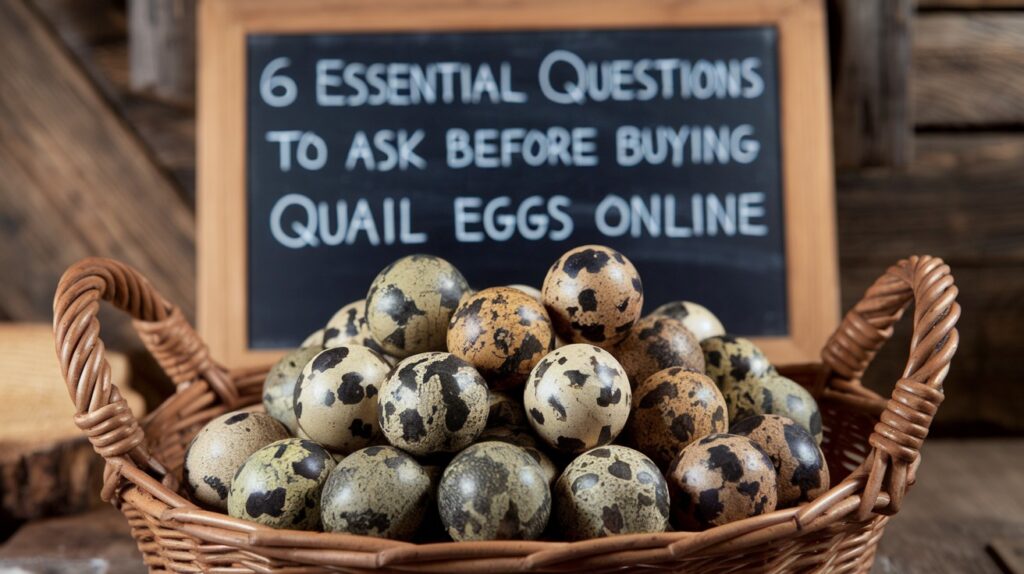Quail eggs have gained attention for their delicate size and balanced flavor. People purchase them for dietary reasons, culinary interest, or hobby farming. Online markets now make these eggs accessible to nearly anyone. Yet, a few smart questions can guide a secure and confident purchase. Here are six key questions that help buyers make clear, informed choices before placing an order.
1. Are the Eggs Collected and Stored Correctly?
Proper collection and storage help determine where to buy quail with confidence. Sellers should mention the collection date, temperature conditions, and handling care. Eggs must remain in a clean, cool space with limited humidity exposure. Buyers can confirm this by checking detailed seller descriptions before checkout. Well-stored eggs maintain color, texture, and taste during transportation.
A responsible seller explains how they preserve and package the product. Refrigeration or controlled environments prevent early spoilage and bacterial growth. Those details sometimes appear on listings or customer response sections. Asking these questions before purchase safeguards against unwanted surprises. Proper storage methods show the seller’s awareness of egg preservation standards.
2. What Type of Quail Eggs Are Offered?
Buyers need to know whether eggs are fertile or table-ready. Fertile eggs are for hatching, while table eggs are fit for direct use. Clear labeling helps customers match the product with their intended goal. Some farms specify breed types, which can influence taste and size. Buyers can then decide based on preference or dietary purpose.
Each quail breed produces slightly different eggs in size and appearance. Knowing the breed supports consistent expectations with future orders. Asking the seller about the breed type creates better clarity before payment. It prevents confusion and helps ensure a more satisfactory purchase. Accurate details save time and support better consumer trust.
3. How Secure Is the Packaging?
Packaging plays a vital role in safe egg delivery across distances. Strong cartons or protective inserts prevent cracks or breakage during transit. Reliable sellers use double-layer materials with cushioning around each shell. The absence of movement inside the box prevents interior damage. Attention to packaging detail reflects professionalism and care.
Buyers can request information about shipping methods and carrier safety measures. Some use foam trays or molded boxes to hold eggs firmly. Others may add an exterior fragile label to alert handlers. These precautions help maintain intact shells and healthy yolks. Asking about packaging specifics ensures peace of mind at delivery.
4. What Is the Source and Seller Transparency Level?
Transparency supports buyer confidence and product credibility throughout the process. Trustworthy sellers provide their contact details and production information openly. They clarify how the birds are raised and what they feed on. Each of these elements affects the final egg quality. Open details simplify decisions and reduce uncertainty for new customers.
A good seller provides honest answers about farm practices and health checks. Consistency in information across product pages signals reliability. Quick and respectful replies to buyer questions show commitment to service. This openness helps customers evaluate long-term purchase options. Verified sellers encourage repeat purchases and build strong reputations.
5. What Shipping Timeframes and Policies Apply?
Egg freshness connects directly with shipment timing and route conditions. Buyers should check estimated delivery periods before confirming payment. Fast shipping helps maintain flavor and quality from farm to table. Any delay in transit may affect texture or shell integrity. Sellers should include delivery tracking numbers for regular updates.
A fair return or refund policy adds another layer of reassurance. Despite careful handling, accidents sometimes occur during shipment. Transparent policies help resolve issues quickly and smoothly. Buyers should review these terms before placing an order. Understanding delivery and policy details creates a smoother buying experience.
6. How to Identify Reliable Sellers Online?
Finding dependable sellers helps ensure a smooth and secure buying experience. A trustworthy seller communicates clearly, maintains consistent information, and presents complete product details. Verified listings and authentic reviews also reflect accountability and attention to product care. Once a buyer confirms these basics, a few extra checks can strengthen confidence before making a purchase.
Here are several focused actions that support safe selection:
- Review how long the seller has been active on the platform
- Check for clear return instructions linked directly to the product page
- Observe the tone and response speed in customer interactions
- Evaluate product consistency through multiple batches, if mentioned
- Look for transparency in photo authenticity and listing updates
Why Trusted Poultry Experts Enhance Every Buying Decision
Choosing to buy from experienced poultry specialists can make each purchase more reliable and worthwhile. Companies that focus exclusively on quality housing and proper bird care sometimes extend that same precision to every related product. Their systems are built to meet practical needs, providing secure structures, consistent craftsmanship, and dependable delivery for poultry owners. Customers benefit from clear guidance, organized logistics, and a smooth buying process supported by knowledgeable teams.
Knowing where to buy quail provides a strong foundation for confident choices. Each question in this guide offers practical guidance for safe, informed purchasing. Understanding product types, delivery systems, and packaging methods ensures satisfaction. Responsible buying supports both consumer confidence and food safety standards. With a little care, anyone can enjoy fresh quail eggs with complete assurance.

